In this episode: A mother of two (3 and 5 years old) writes that she became a parent “with every intention of validating my children’s emotions and teaching them emotional expression.” Now she feels that perhaps her good intentions have backfired, and that her children’s whining and crying aren’t always genuine but may instead be an act. She says, “It’s as if they play the dramatic role for me, but they can just as quickly shift out of it.” She’s wondering if Janet has any insight into this dynamic, and especially how she can improve it.
Transcript of “Stop Being a Captive to Your Children’s Emotions”
Hi, this is Janet Lansbury, welcome to Unruffled.
In this week’s podcast, I’m responding to a parent who’s concerned that she may be creating monsters, because it feels like her children are whining and crying all day, and almost seems like a performance that gets louder and more dramatic. She’s wondering how she can shift this. Here’s the email she sent me:
“Hi Janet, I’ve recently discovered your work and it is changing my life. I’ve read both of your books and found them incredibly valuable in helping me balance accepting my children’s emotions with setting limits and being a calm, confident leader. I’m wondering if I can ask you a question if you have time.
I have a five-year-old and a three-year-old, I am a therapist myself, so I went into parenting with every intention of validating my children’s emotions and teaching them emotional expression. My struggle is that sometimes I wonder if I’ve created a monster. Sometimes my children’s emotional expressions feel performative rather than genuine. Around me they whine and cry significantly more than they do with others, or when I leave the room and they play by themselves. Sometimes it feels like they whine and cry all day. I’m tired of hearing myself say, “I hear that you’re upset, I just need you to use a regular voice with me.”
For example, every day, leaving for school is a struggle. I give them a two-minute heads up that we’ll need to put on shoes and jackets, then I come over to them and say, “It’s time for us to put on shoes and jackets.” Inevitably, they both say no and began flailing and whining loudly. If I say, “I know it’s hard to stop playing, you want to keep playing, but I need you just to get ready to go.” They get louder and more dramatic, they run away from me. Then their dad will come by and say, “Lose the ‘tude kiddos, time to go.” And they will start laughing and do what he says. It’s as if they play the dramatic role for me, but they can just as quickly shift out of it.
I’m wondering if there’s something I can do better. Is it possible to reinforce their wining and crying too much? Thank you for reading.”
Okay, one of the reasons I love this story and question is that this mother offers a wonderful example of the way that we can learn from each other as parenting partners. This dad’s way of handling the situation is not exactly what I would recommend word for word, but I can understand why it works. Understanding that will be helpful to this mother to see what she can do, as she says, “better.” I don’t know if it’s really better, but it’ll be more effective, and easier for her, and more comfortable for her.
The difference with this dad is that he came into this as a confident leader. While this mother says that she is being a calm confident leader, and I’m sure she is a lot of the time, in these instances where her children are venting these emotions and whining and falling apart in front of her, she seems to be, for some reason, losing her confidence. She’s getting bogged down by the emotions, the meltdowns, and the loud dramatic defiance. And what I want to understand is why she’s getting bogged down.
She seems to be getting overwhelmed, getting stuck in this herself. That is why it’s continuing, because children seem to need to explore that. I believe that they, on some level, are working on us all the time. They’re working on us to try to mold us into the leaders that they need. So they’ll keep showing us where we might need a little work
Now, I’m imagining that, because this mother is a therapist, and she says in the beginning of this note that she went into parenting with every intention of validating her children’s emotions and teaching them emotional expression… So she is taking this on as her role. And it’s a good role. But I think we have to understand how children actually learn emotional expression. They learn primarily through our modeling about emotions and emotional self-control. They also learn this through the development of their prefrontal cortex. And they learn that their emotions are valid by us allowing them and accepting them.
But that doesn’t mean we have to be stuck as a captive audience or to try to do some kind of work with these feelings, to try to teach and actively show and validate, and work children through their emotions. That’s an expression that some people use that I don’t use, because it communicates that there’s some activity that we need to be doing. We need to say the right words, we need to do the right thing, help our children with these emotions. And, really, children are the experts in the room at venting their emotions, they’re very free with them. As this mother sees, her children are not only free, they’re operatic as many children are.
Children let them out fully and beyond fully. They even milk them a little bit sometimes. So they don’t really need help with that. My sense is that this parent is taking on a role and a job in these moments that really isn’t hers, and that it would be better to let go of.
Yes, there are times when a child is having difficulties, is uncomfortable, and we are there, and we’re not trying to get out the door, we can be there and stop, and be that therapist for them that listens and is patient, as this mother is. She’s got wonderful patience. But I think it’s getting in the way of her confident momentum. She needs to move through the feelings herself instead of getting pulled by them and stuck in them.
It’s almost like there’s a routine that these children and their mom have together where the children are kind of putting on a show, indulging themselves to the hilt in their inability to transition, to get out the door. Children have such a hard time with that.
So at those moments, especially in those transitions, children need us to really trust and let go of them feeling whatever they feel, and keep our focus on the task, getting them out the door.
And that will actually teach our children all the things that this therapist and most of us that care about emotional health want to teach our children. We normalize it.
Yes, it’s normal to have a really hard time getting out in the morning. I have that problem myself. I have a problem getting out to do things I want to do, and I sometimes do whine, or at least want to whine and yell loudly, and just fall on the floor, and have somebody get me into action. So I can relate to this, I know what it’s like.
Now, how will that look? With the father, it looked like he was saying, “Cut it out, we gotta go.” We don’t have to say, “Cut it out.” I think it’s actually much stronger and shows more leadership to say, “Ah, yeah, you guys are feeling what you’re feeling and we still gotta go, and here we go.” Not getting intimidated by it.
So this mother says, “It feels like they whine and cry all day. I’m tired of hearing myself say, ‘I hear that you’re upset, I just need you to use a regular voice with me.'”
So, “I hear you” is one of the phrases that I sometimes recommend, but it’s got to come out of, “I hear you,” letting it go, letting it be, not, “I hear you, I hear you, so stop feeling that way,” which I think might be the way this mother is saying it, because it seems like she’s getting a little stuck trying to say the words again, and do something with the feelings, rather than normalizing them and letting them go.
So then she says, “I just need you to use a regular voice with me.” In this instance, I think that’s very much indicating to her children that she’s aggravated and they’re doing something that’s bothering her. It’s grating on her, and she’s getting a little overwhelmed and stuck there.
Now if there’s something specific that they say that she can’t understand, then I would say, “Wow, can you say that to me differently, I can’t quite understand.”
But again, it’s got to come out of this is you guys, this is what you feel, I’m not gonna get sucked into this. I’m separate, and I am the leader, and what you’re doing is normal. That perception is what frees us. We can handle it.
And it’s interesting because if we do come in with that confident momentum, we find that, yes, a child might still try to run away, but usually there’s not as much of that, because they tend to kind of melt into that feeling of somebody’s taking charge, just like they do with their father in this example.
But since this has been their m.o. together, they probably will test, now I’m gonna run away, and then we’ve still got to stay in that confident mode. “Oh, there’s somebody running away over there. Okay, I’ll be with you in a second, I’m just getting your sister ready (or your brother ready), we’re all going to get out… Oh, okay, I gotta find that person now. Where is he?”
If we feel on top of it, if we don’t feel threatened by it, we’ll find that, really, there’s just no power in it for our child, and our child will feel like they can let that go, and not do so much testing. They might still flop around, but we’re so strong that we’re chill about this, we can do this job, we can get these little monkeys out the door.
This is also true in other situations. If mom needs to make dinner or is doing something for herself, or talking on the phone, and her children start whining and carrying on, we can still allow them to have their feelings, while holding ourselves separate, and being confident in what we’re doing, moving through it fearlessly.
I love the expression, “The only way out is through.” For me, it describes beautifully how we all have to allow ourselves to feel. We keep moving forward, but we don’t try to push it away, we don’t try to ignore it, stuff it, pretend we don’t feel that way. Having that attitude makes a huge difference. We can handle it.
So we’re showing them that this is normal and that we’re not afraid, by taking the steps to move forward. We don’t have to force them into snapping out of it and feeling better and coming with us. We’re going to show them. We’re going to put our arm around their shoulders, help them get that stuff together. We’re going to use connection, rather than shouting from a distance, “Come on, it’s time, snap out of it!”
That is relationship building, that will give our children all the messages we want them to receive about our feelings about emotions, our feelings about them, and our feelings of confidence in ourselves as fully able to care for these children that we adore and be the parent they need us to be.
She says, “I give them a two-minute heads up that we will need to put shoes and jackets on.” I don’t think I would give them the heads up, because I think what’s happening is that that’s coming off as kind of a cue. All right everybody, get on stage soon, the show’s about to begin. And maybe she’s even coming off there with some trepidation. Okay, we gotta leave in a few minutes, I hope you guys behave. I don’t know if she’s doing that at all of course, but I’m wondering.
If we are going to give the heads up, I would just say, “Oh guys, I thought you wanna know, we’re going to leave in a few minutes.” Very politely, not in a manner that would create a power struggle or signal that we may not be up to this challenge this morning.
So I think she could skip the warning and I think she could come over and say, “Okay guys, we’re going to get dressed now. What do you guys want to do? What am I going to do? How can we help?”
And then they say, “No, no, we don’t want to go.”
“Oh shoot, I hear you don’t want to go. Darn, we have to go, so I’m going to help you out here. I’m going to take your hand, I’m going to take these shoes, I’m going to pick a shirt for you. Can I see that head please? Can you put it through?”
Engaging, connecting, unruffled.
And don’t be afraid when they get louder and more dramatic, just welcome those storms, welcome the drama, welcome the opera. It’s really okay to be in conflict with our children this way in terms of their wants in the moment. It can’t bring us down unless we let it. That’s when we have to take charge in the most loving gentle way, unafraid of their emotions and unafraid to really look in their eyes and see them and nod our heads. “Uh-huh, there you go again, very funny, mister. Nope, we’re not doing that.” It’s an attitude.
And again, often the key is to look at ourselves and what is getting in our way and unclutter this experience for ourselves.
I hope some of that helps.
Also, please check out some of my other podcasts at janetlansbury.com. They’re all indexed by subject and category so you should be able to find whatever topic you’re interested in. Both of my books are available on audio, No Bad Kids, Toddler Discipline Without Shame and Elevating Child Care, A Guide To Respectful Parenting .You can get them for free from Audible by following the link in the liner notes of this podcast, or you can go to the books section of my website. You can also get them in paperback at Amazon, and an e-book at Amazon, Barnes & Noble, and apple.com.
Thank you for listening. We can do this.

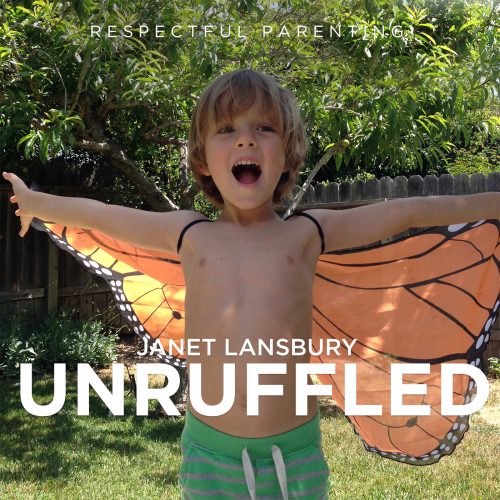
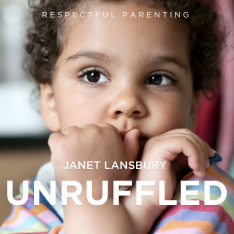
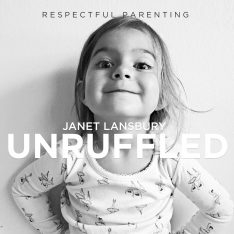


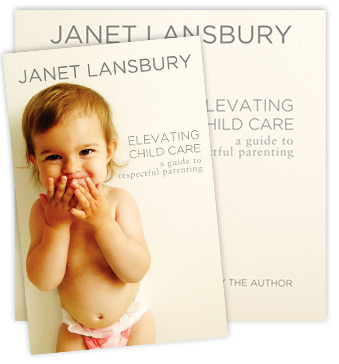

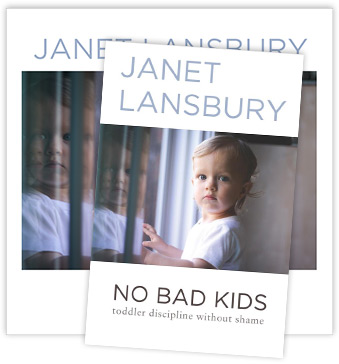




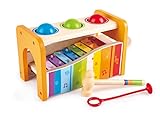

Thank you, this is exactly what I needed. I have a 4.5 year old with the same behaviors, and an 18 month old closely watching him. I now see how much my own response is driving this. It’s exactly the same feelings as you describe this mom as possibly feeling!
Do you think there is any possibility that the approach of remaining emotionally unaffected by your child’s behavior might end up with the child not understanding how their behavior affects others? If they can yell and scream at a parent will that turn into yelling and screaming at a partner because their self expression is more important than how they make others feel? I’ve noticed sometimes when my toddler is having a fit and yelling and saying mean things, if I try to stay unruffled and unbothered he keeps going, but if I sit down and hang my head and say his words make me sad, he feels bad and stops the fit much sooner and comes over and hugs me. Obviously we don’t want to hand over emotional control to our children. But I’m just wondering if there is some kind of balance we need to strike between being the strong confident leader that nothing phases and teaching children the value of being vulnerable and encouraging empathy. I guess I don’t understand how we can be encouraging full emotional expression in children when the parent isn’t expressing the emotions that arise from the child’s behavior (anger, frustration, sadness, etc) at all.
I agree with Tess and was thinking the same thing. Curious about how my 3 year old is going to learn that his actions can cause others harm or frustration and he need to learn that those actions can have consequences (such as people not wanting to be around him). Thoughts on this Janet?
I would really love your thoughts on this too Janet!
I’m going through this in a less intense way with my 15 month old but after reading this I can see what I’m doing wrong. Hopefully I can nip it in the bud now that I’m aware of what I’m doing wrong. It’s funny whenever I read your answers to the problems I always think I kinda knew what I was sling wrong, like I knew what the answer would be from you, but it still helps me so much to see it written down or spoken out loud. Thank you again.
Very very helpful even at our kids’ ages (7 & 9). I get stuck feeling like I have to fix everything before we can get on with whatever we were trying to do. It’s encouraging to know that we can just move through it and not give it more power.
Yes, exactly! We’re not ignoring, we’re accepting and letting it be.
I need your help!! What do you say when your five-year-old wants to keep arguing and then starts firing back with responses that are similar to my own?? This morning my son asked if he could play the iPad. I said “I know you really want to right now, and I’ll let you play when your sister goes to sleep”. He kept saying he wants to do it now, I acknowledged his feelings about wanting to play now many times, and he still kept pushing it. I ended up yelling at him. Then he yelled back. I say “I don’t like the way you’re talking to me”, he tells me that he doesn’t like the way I’m talking to him. I say “I’m sorry I yelled, I know you’re feeling upset I’m not letting you play the iPad”. “He says “I don’t feel upset, I am upset”. It sort of all just kept going back and forth. Then he says I lied to him because I said he would get to play. I just don’t know how to responds to the stuff he says especially when he says I’m lying when I wasn’t.
As a pre-K teacher for over thirty years , I have seen parents become increasingly lax in discipline and organization. Children thrive on schedules and predictability. Get dressed first thing, before breakfast. No iPads in the morning (or ever when they’re young) . Tell , don’t ask. Set out their clothes the night before. “Get dressed, then we’ll have breakfast.” “After you (make your bed, i.e.) then you may ( play with dolls, i.e.). Not every feeling needs to be acknowledged. I can’t tell you how many times a “whiny” child has been left with me with the excuse of “ooh he didn’t sleep well” and two seconds later he’s fine. Because the teachers are not validating every emotion. Parents, please stop coddling and allowing your children to run your lives. Don’t engage every time. And never get into a negotiation with a child who is being disrespectful.
Yes, to this! I was worked with children for over 20 years and this is so true. It’s so hard to explain to someone who hasn’t worked in the childcare field.
The most enjoyable families that I nannied for, were the families that provided structure and had a no-nonsense relationship with their children. The parents were in charge. Firm, but that doesn’t mean not loving.
And I actually saw such a big difference in the parenting styles and the behaviors of children, that when it was a time to start my own family, I knew that I would parent the same way. I always say, parenting in itself is exhausting enough – the laundry, the meal planning, the constant care that children require, that I wanted to make sure the rest was relatively enjoyable.
I’ll have to add though, my husband, he didn’t set the same tone with our children. With him working many hours, or him not having much experience with children, he let discipline slide and because of that, our two boys act differently with him. They don’t listen as well and I have to step in. Children are very bright and pick up quickly as to what is accepted and allowed in regards of their behavior. And even though I am the no-nonsense parent, they still love my husband and I the same. ☺️
Where are the liner notes to get the audibles free?
Hi Christina! You can click on the links for my books and you will get to the free offer from Audible. Thanks for your interest!
I am in that boat! Although! My husband is an adult child of an alcoholic, was neglected, molested, and abused growing up, and is a combat veteran to boot. The sound of kids crying gives him flashbacks, and before I know it I feel like I am dealing with three toddlers instead of two. So whenever the kids start whining/crying, I am instantly stressed, and they sense it. I don’t know that there is a solution exactly. Everybody’s growing and getting better, so maybe it’s just an endurance game.
It’s good that you are able to anticipate that stress, that you’ve recognized a pattern. It gives the perfect opportunity to model accepting emotions while continuing through them, to paraphrase Janet’s post. I do this for myself like so: “I notice that I am tense & stressed because of my past experiences with similar situations, and these are okay, to feel worried about things happening at the right time with everyone happy, because these are normal things everyone feels sometimes. I accept that I feel this way and continue to do the next right thing & the next thing right, to do my best & accept my best. Emotions tell me where I’m at, not defining what I’m capable of. I’m engaging the fullness of my experience by being aware of my feelings in the moment while pushing on; my feelings indicate to me how important it is to me that I do keep going, to use that to propel me & give me confidence instead of slow me down.” This has helped me, and I hope it can help you!
This makes a lot of sense, but I must say that I worry that the confident momentum doesn’t blind me to my child’s needs in a moment. Does that make sense to anyone?
Yes it does! I’m afraid of this too. What if my confident momentum causes me to miss that she actually really needs something from me in that moment and I’m brushing her off?
Hi Janet,
I have a question about your commentating:
““Oh, there’s somebody running away over there. Okay, I’ll be with you in a second, I’m just getting your sister ready (or your brother ready), we’re all going to get out… Oh, okay, I gotta find that person now. Where is he?’
I feel as though this is setting up a stage for the children to goof around and play a game.
I don’t believe this would make me look like a confident leader.
Can you clarify my concerns please?
Thanks,
Absolutely have the same issue. My guy just laughs hysterically to this sort of chill attitude and I have to physically pick him up and essentially man handle him into his clothes, with him laughing and wiggling the whole time trying to restart the “game”. Now that I’m 33 weeks pregnant I can’t safely lift and control him physically. It seems every answer boils down to that though, the “I see you need my help, I’m going to take you by the hand” etc all requires physical intervention.
I cannot express how grateful I am for this episode. I find myself coming back to this episode every few months for a reminder of how I need to remain strong for my children, and not be bogged down by their intense emotions.
“ And don’t be afraid when they get louder and more dramatic, just welcome those storms, welcome the drama, welcome the opera. It’s really okay to be in conflict with our children this way in terms of their wants in the moment. It can’t bring us down unless we let it. That’s when we have to take charge in the most loving gentle way, unafraid of their emotions and unafraid to really look in their eyes and see them and nod our heads.”
I am struggling with daily battles to get dressed, brush teeth/hair. If I respond playfully and calmly, it’s a battle. If I lose my cool and my frustration shines through, it’s a battle. It feels like no matter what I do, I end up man-handling and forcing my daughter through the actions to get out the door. Welcoming the drama doesn’t change the fact that it’s a struggle that is getting increasingly difficult as my daughter gets stronger! I don’t know what to do.
Hi! Would love to know the details of your morning. Also, I have a couple of posts specifically about getting out the door in the mornings. Here, I’ll link them in case you’re interested.
This one’s a written post: https://www.janetlansbury.com/2015/09/the-secret-to-getting-out-the-door-with-a-resistant-child/
This is a podcast that may be better to listen to, rather than read: https://www.janetlansbury.com/2018/05/getting-dressed-daily-struggle/
I have 3 kids- 8f 6m 2m. It just takes so much of my energy to physically force my will on them all the time. They are so strong in their resistance and power. They always want to do what they want to do and I’m tired of forcing them in another direction. Why am I out here pretending like i know what’s best for them? I don’t actually know. I’m not sure that what i choose for their day would in any way be better than how they choose to spend their day. As long as they’re safe, and I’m there when they need help, why am I using so much energy trying to “parent” them?
What is it that I’m confident about exactly? I feel better and they feel better when I let them do whatever and instead i spend my energy on myself and my passions. The only thing that prevents me from just letting them be is MY OWN fear of being a failure as a mom. That’s not a good reason?! How do a be a leader and model adult behavior when I’m more fearful than they are? Who is actually leading who here? It makes no sense to me anymore. What happens when we fall into the deep end as parents and question too much, losing our grounding? My own resistance is growing and I’m not sure I can overcome it. I’m not sure I even want to. I have faith in love and in us, but that doesnt inspire me to lead. I feel like I get nothing out of it. Being a leader is too hard, why do we even do it?